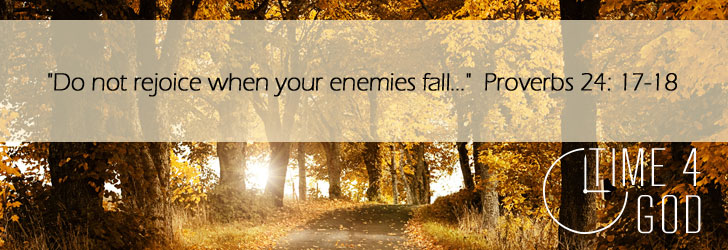
Oh, oh. There God goes again; turning all of our values up-side-down. ʺDo not rejoice when your enemies fall, and when they stumble, do not let your heart exult..?ʺ But that is what we have been raised to do. Our enemies have injured us. They have had power over us and they have made our lives miserable. Why should we not rejoice when they get what they deserve? That is the way it has always been. Why should we change our ways now?
These are questions and attitudes that we find all too familiar. There is something in us that wants to rejoice when those who harm us get a little bit of their own medicine. It seems only fair to us. It seems like the proper payment in the economy of justice in this world. What is God trying to tell us in this small passage from the Book of Proverbs? The next verse give us something even more challenging to think about. ʺLest the Lord see it, be displeased with you, and withdraw his wrath from your enemies.ʺ Woe! What to do with that thought?
While we may struggle in terms of human logic to fully understand this proverb, Jesus will show us the meaning of it with his own words and actions. He continues the history of God always throwing our human logic into a tailspin. In his Sermon on the Mount, Jesus takes all of our old values and turns them on end. But as we see by through faith, his logic makes ours look like a fools quest, indeed.
[content-ad]
The sermon takes up the whole 5th chapter of Matthew’s gospel. Here he tells us things like, ʺDo not think I have come to abolish the law or the prophets. I have come not to abolish but to fulfill.ʺ And, ʺYou have heard it said in the past, ‘You shall not kill; and whoever kills will be liable to judgment. But I say to you, whoever is angry with his brother will be liable to judgment…ʺ And ʺBut I say to you whoever divorces his wife causes her to commit adultery, and whoever marries a divorced woman commits adultery.ʺ And ʺAgain you have heard that it was said to your ancestors, ‘Do not take a false oath, but make good to the Lord all that you vow. But I say to you, do not swear at all; not by heaven, for it is God’s throne; nor by the earth, for it is his footstool…Let your ‘Yes’ mean ‘Yes’ and you ‘No’ mean ‘No.’ Anything more is from the evil one.ʺ And ʺYou have heard that it was said, ‘An eye for an eye and a tooth for a tooth.’ But I say to you, offer no resistance to one who is evil. When someone strikes you on your right cheek, turn the other one to him as well.ʺ But, here is the kicker: He practiced what he preached with his very life. Then he commanded us to do the same: ʺLove as I have loved you.ʺ
This is earth-shaking stuff. The question we have to ask ourselves is this: ʺWhat would the world be like if more and more people acted in accord with the wisdom of God? If we did not return evil for evil, would that not reduce the evil in the world? Certainly, we would not be adding to it. If we loved our enemies, instead of rejoicing when they ʺget what they deserve,ʺ might we not be a potential catalyst for their conversion? Look at Saul. He was a man full of violence and purpose against the early Church. He was an enthusiastic encourager of the stoning of Stephen: ʺNow Saul was consenting to his execution.ʺ (Acts 8:1) He was close enough to hear Stephen’s words just before he died, ʺLord Jesus, receive my spirit. Then he fell to his knees and cried out in a loud voice, ‘Lord, do not hold this sin against them.’ Then he fell asleep.ʺ (Acts 7: 59-60) We can imagine that Saul’s conscience was pricked and that this event, this forgiving act of Stephen’s, might have been the beginning of Saul’s conversion. Though Saul was stubborn in his pride, witnessing Stephen’s faith and his earlier wisdom, hearing his dying wish that his death not be held against those who caused it, had to have reached something deep inside this future great saint’s soul.
God’s wisdom is far beyond our wisdoms. If we can bend our wills to see his wisdom, we may be able, finally, to find the peace and the happiness that we are always seeking. After all, it is clear that our wisdoms are not getting us there.
SKM: below-content placeholderWhizzco for FHB

